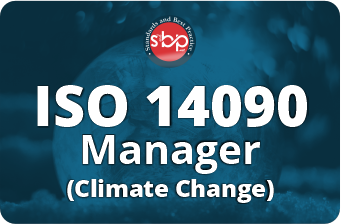ISO/IEC 14090:2019 - ADAPTATION TO CLIMATE CHANGE
- Home
- Certifications
- ISO/IEC 14090:2019 - Adaptation to Climate Change
Description
ISO 14090 is an international standard that specifies requirements describes principles, requirements, and guidelines for adaptation to climate change. These include integrating adaptation within or across organizations. The standard helps organizations to identify and understand impacts and uncertainties and how these can be used to inform decisions. It helps them to report adaptation actions too. The standard can be used by any organization whose activities, products and services might be at risk from, or in some cases able to take advantage of, climate change.
An ISO 14090 certificate ensures a formal and independent recognition of an individual professional competences. By adopting ISO 14090, the certified professionals will help organizations to enhance their capacity to secure and coordinate resources for climate change adaptation.
Benefits of ISO 14090 Certification
- Gain expertise on Climate Change Adaptation
- Help an organization to enhance its understanding of climate risk and adaptation
- Better utilization of resources
- Credibility recognized on a national and international scale
-
ISO/IEC 14090 Manager:
ISO 14090 Manager training enables participants to learn the basic elements on the concepts of Adaptation of Climate Change and an overview of the ISO 14090 requirements. By participating in this training course, you will be able to understand concept of vulnerability, impact and risk assessment related to climate change, concept of the planning, implementation and monitoring assessment of adaptation measures, and typical cases of damage and countermeasures from climate change
After completing this course, participants can sit for the exam. Once participants meet the pass mark, he/she will be given a “SandBP Certified ISO 14090 Manager” credential. By holding a S&BP Manager Certificate, the participant can be able to demonstrate that he/she has the practical knowledge and professional capabilities to manage the adoption and implementation of ISO 14090 in an organization
Certification
- Candidates who score 70% and above in the examination will be issued an SANDBP certificate.
- In case you do not meet the pass mark, you can retake the exam for FREE after the first attempt while subsequent retakes would come at a cost.
Criteria for Suspending and Withdrawing the Scope of Certification
SANDBP reserves the right to suspend or revoke certifications for reasons including fraud, deceit, or submission of inaccurate data.
Process:
- Certificate holders will be notified by certified mail if evidence of charges is found.
- They may present their defense in writing to the certification board.
- The board will review the case and decide to uphold or deny the suspension/revocation.
Causes for Suspension/Withdrawal:
- Improper use of certificates/logos
- Malpractices
- Providing false information
- Ineligibility for applied examinations
- Voluntary suspension requests
Recertification Process
Recertification ensures that certified individuals maintain their knowledge and skills in line with the latest standards and practices. It is a critical process that reaffirms the competency of certified professionals, allowing them to stay current with evolving industry standards.
Criteria for Recertification:
-
Transition Exam:
* Individuals must take and pass a transition exam when there is a change in the current version of the certification standard.
* The transition exam focuses on the updates and changes in the new version of the standard, ensuring that certified individuals are knowledgeable about the latest requirements and practices. -
Adherence to Code of Ethics:
Certified individuals must adhere to a code of ethics, demonstrating professionalism and integrity in their practice. Any violations of the code of ethics may result in the suspension or revocation of certification
-
Payment of Recertification Fees:
Payment of the required recertification fees is necessary to process and validate the renewal of certification.
Introduction
To maintain the integrity and fairness of our examinations, specific guidelines have been established for proctoring. These rules apply to all candidates and must be adhered to strictly. Failure to comply may result in disqualification or other disciplinary actions.
General Requirements
Technology Setup
- Device: Use a desktop or laptop with a working webcam and microphone. Mobile phones or tablets are not permitted unless explicitly allowed.
- Internet: Ensure a stable internet connection with sufficient bandwidth to stream video and audio continuously.
- Browser: Use the designated browser as specified by the exam platform.
- Power Backup: Ensure your device is fully charged and/or connected to a reliable power source.
Environmental Setup
- Location: Choose a quiet, well-lit room with minimal distractions.
- Background: Ensure the background is plain and free of any clutter or distractions.
- Privacy: No other person is allowed in the room during the examination.
Pre-Exam Procedures
Present a valid government-issued photo ID or institution-approved identification document. Ensure that no unauthorized materials (e.g., books, notes, or electronic devices) are present.
During the Exam
Behavior Guideline
- Focus on the Screen: Avoid looking away from the screen for extended periods.
- No Assistance: You are prohibited from receiving help from anyone or any external resource.
Prohibited Items
- Electronic devices such as mobile phones, tablets, smartwatches, and earphones.
- Books, notes, or any other study material unless explicitly permitted.
Proctor Interaction
- Follow all instructions given by the proctor.
- If contacted for clarification or rule enforcement, respond promptly and cooperatively.
- Inform the proctor immediately in case of technical issues.
Post-Exam Procedures
Submission
- Ensure your exam responses are submitted within the designated time.
- Do not close the exam window or disconnect until you receive confirmation that your submission is successful.
Feedback
- Report any technical issues or concerns to the designated support team immediately aƜer the exam.
Violations and Consequences
Examples of Violations
- Using unauthorized materials or devices.
- Attempting to impersonate another candidate.
- Engaging in suspicious behavior (e.g., frequent movement, talking).
- Disconnecting intentionally without justification.
Consequences
- Warnings for minor infractions.
- Disqualification of the exam attempt for major violations.
